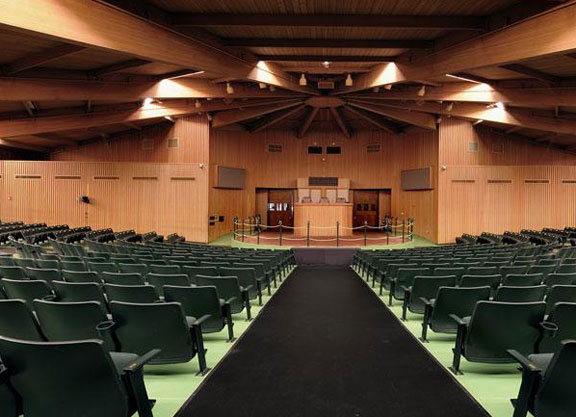By Jessica Martini
The Keeneland January Horses of All Ages Sale concluded its five-day run Friday in Lexington with numbers mostly in line with the auction's 2015 results, but with a prevailing selectivity in bidding which saw the median decline 31.25%.
“The January sale continued on exactly as the November sale was,” commented Keeneland's Director of Sales Geoffrey Russell. “It's a very selective market where quality is rewarded. We saw in September and November and now here, this market is a good market, but it's not a wonderful market. It's highly selective.”
Craig Bandoroff, whose Denali Stud consigned the auction's two highest priced lots, agreed.
“It's all the ones they want,” Bandoroff said. “If you've got a good one and he passes the tests, there is a market for them.”
In all, 1,040 horses sold for $35,463,000. The average of $34,099 declined 8.44% from 2015, while the median dropped 31.25% to $11,000. A year ago, 948 horses grossed $35,305,500 for an average of $37,242 and a median of $16,000.
A total of 1,796 horses were catalogued for the five-day January sale, compared to 1,610 in last year's four-day auction. With 409 outs, 1,387 horses ultimately went through the sales ring in 2016, with 347 failing to meet their reserves. The buy-back rate was 25.02%, on par with last year's figure of 25.18%.
“There are a lot of different reasons for the outs; mares who foal, yearlings that didn't do well, or people who did better than anticipated in November and decided they could wait until September,” Russell said. “Maybe they realized it is a selective market and they should stay home.”
The dispersal of the estate of Sarah J. Leigh provided the top two lots at the January sale, as well as the co-topping short yearling, and Virginia Kraft Payson was the winning bidder for all three. Payson paid $700,000 for the Grade I-placed mare Summer Solo (Arch) (hip 259), in foal to Ghostzapper, and came right back to secure that 5-year-old's juvenile half-sister Summer Sweet (More Than Ready) (hip 260) for $550,000.
Also from the Leigh dispersal, Payson paid $450,000 for a yearling filly by Arch (hip 230). Gatewood Bell's Cromwell Bloodstock matched that price to secure the sale's only War Front yearling (hip 48). That colt was one of the final offerings from the dispersal of Jerre Paxton's Northwest Farms.
Results at the January sale, which was topped a year ago by the $2.2-million Up (Ire) (Galileo {Ire}) and her $800,000 War Front yearling, were likely somewhat tempered by the withdrawals of two mares who figured to attract plenty of interest. Peace Burg (Fr) (Sageburg), who foaled a War Front filly just days before the sale, and Yearly Report (General Meeting), who was the only catalogued mare in foal to leading sire Tapit, were both no-shows in the January sales ring.
But there was still plenty of strength at top of the market in 2016. While 24 horses made $200,000 or more last year, that figured increased to 37 in 2016. Ten sold for $300,000 or more in 2015, four horses brought for $400,000 or more and two eclipsed the $500,000 mark a year ago. In 2016, 12 horses brought $300,000 or more, six sold for $400,000 or more and three were over $500,000.
“The upper middle market was very strong–obviously we didn't have a breakout mare, the mare in foal to Tapit and the mare in foal to War Front were out–but the next level down was very, very strong and very competitive,” Russell said. “It's a level of the market that people feel more comfortable that they could get a good return on their investment.”
During five days of selling, 403 yearlings grossed $13,077,400. The yearling average of $32,450 was up 1.9% from 2015 when 324 yearlings sold for an average of $31,847. The 2016 yearling median of $11,000 was down 26.7% from last year's figure of $15,000.
At the top of the yearling market in 2015, 21 yearlings sold for $100,000 or more. That group averaged $189,762 and had a median price of $150,000. That segment of the market remained vibrant in 2016, with 35 yearlings bringing six figures, but without a breakout horse of the likes of last year's $800,000 War Front filly, the average dipped 10.3% to $170,143, while the median remained constant at $150,000.
“The yearling market was very strong, continuing on from November,” said Russell. “It might be the start of a new trend of end-users buying foals and short yearlings. That adds a little more competition for the pinhookers. Some of the pinhookers made the comment that they had to stretch for some of the nicer yearlings.”
Uncle Mo Colt Tops Day Five
A 2-year-old colt by Uncle Mo, who entered the ring as the final horse in the January sale, was the top-priced lot during Friday's session of the five-day auction, bringing a final bid of $80,000 from bloodstock agent Donato Lanni, who signed the ticket in the name of Eico Ventures.
“He's by [leading freshman sire] Uncle Mo,” Lanni, who bought the colt on one bid, said of the colt's appeal. “He looks like a strong horse. We usually don't buy 2-year-olds in January, but he was just a nice horse.”
Hip 1795 was consigned by Jim and Pam Robinson's Brandywine Farm as agent for the dispersal of the Estate of Eric Delvalle. He is out of Panamanian champioin Amor de Palacio (Cashel Castle).
Plans are to race the colt, according to Lanni, but no trainer has been picked out yet.
During Friday's final session of the January sale, 197 horses sold for $1,790,100. The average was $9,087 and the median $5,000. With 78 horses reported not sold, the buy-back rate was 28.36%. There was no comparable session from last year's four-day sale.
Not a subscriber? Click here to sign up for the daily PDF or alerts.






